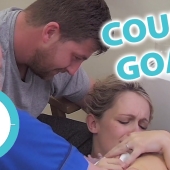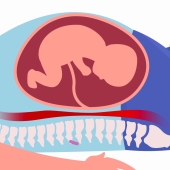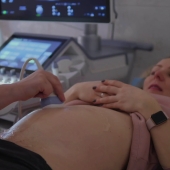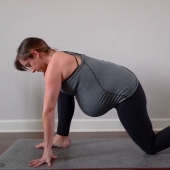When you are pregnant you will feel your baby move in your womb. This is normal and it gives you reassurance that your baby is well. However, if your baby’s movement reduces or changes, it may indicate that something is wrong.
Around half of women who had a stillbirth noticed that their baby’s movements had slowed down or stopped. This video will help you to understand what is normal and what to do if your baby stops moving.
What is normal for my baby?
Most women will begin to feel their baby move between 16 and 24 weeks of pregnancy. It is usually after 20 weeks for first time mothers, and earlier for mums who have been pregnant before. You will feel the baby’s movements as a kick, flutter, swish or roll. If you don’t feel your baby moving by 24 weeks, you should contact your midwife.
Each baby is individual and therefore it is important that you get to know your baby’s normal pattern of movement so that you can recognise changes as they occur. Often if you are busy you may not notice all their movements, but do try to stay aware of them.
If your baby’s back or the placenta is lying at the front of your womb, it won't be as easy to feel your baby move. But they will still be moving and you need to familiarise yourself with their usual pattern of movement.
Their movements will change during the course of each day. Usually they will move most in the afternoon and evening. And your baby will go to sleep for between twenty and forty minutes at various times during the day and night. These naps very rarely last for more than 90 minutes and during these times you won’t feel your baby move.
The amount of times your baby moves will gradually increase until you are 32 weeks pregnant. Then it will stay about the same until you give birth. You should even feel your baby moving when you are in labour.
What can cause my baby to move less?
If your baby’s movements change or become less frequent, this may indicate that something is wrong. Reduced movements may be caused by smoking, drinking alcohol, or taking strong pain relief or sedatives.
Or it may be because your baby is unwell. Very rarely, it can be because your baby has a condition that affects their muscles and nerves which means they move very little or not at all.
What should you do if your baby's movements have reduced or changed?
If you think your baby’s movements have reduced or changed, seek advice immediately. Don’t go to bed or wait until the following day. If you are between 20 and 25 weeks pregnant, contact your community midwife immediately. If you are more than 26 weeks, ring the maternity assessment unit or delivery suite as you may need to be seen in the hospital.
If you are unsure whether or not your baby’s movements have changed, lie on your left side for the next 2 hours. If you do not feel ten or more separate movements during these two hours, you should seek advice.
Don’t use hand held monitors, ultrasound probes or phone apps to check your baby’s heart beat. Even if you detect a heart beat, this doesn’t mean everything is okay.
In hospital , you will be seen by a midwife or doctor who will carry out a check including measuring the size of your uterus and your blood pressure. A urine sample will be taken to check for protein and your baby’s heart rate will be measured. The midwife or doctor will then give you advice depending on what they find.
What should I do if it happens again?
Any time you notice a change or a reduction in your baby's movements you should seek advice immediately. Even if you have been seen before with the same problem and your baby was found to be well, you should still seek advice. Never hesitate to contact your midwife or maternity unit, no matter how many times this happens. If you have any questions, please speak to your midwife.
- 1443 views













